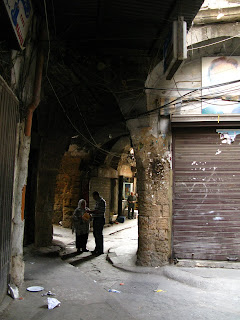
I went to Beirut to catch a plane back to Jordan. There was a chance that I could have gotten back into Syria, but it would have taken hours to find out, and I'm just not that into finding out the hard way. A flight all the way to Aqaba was only $200 and it allowed me to enter Israel at the very easy (aka no interrogation) border at Wadi Araba. It seemed worth it.
After visiting the tourist mecca of the Beirut Holiday Inn, which rivals Sarajevo's for best sniper position, I hailed a taxi to the airport.
Well, my driver was from Dahyl, a southern suburb of Beirut and seemed very upset I hadn't heard of it. "We are the home of Hezbollah! You must know. Come on, I'll show it to you!"
He gets off the highway and takes some side streets. Suddenly, there were a few bullet holes on the side of a building, then suddenly EVERYTHING was new.
"This is where Israel attacked in 2006. Everything go down. 182 buildings, but now Hezbollah rebuild it all. Iran helps us!" He shows me immaculate schools and hospitals. We pass a banner saying "Israel, you push, we push. You fight, we fight." and another saying that the USA supports Israel, so the USA did this.

Their famous leader, now dead, has his picture everywhere. he shows me his old home, and the Mosque where he talked. There is a sign banning cellphones and guns on all of the doors.
Then he shows me the Hezbollah TV broadcasting studios - "You know this, Hezbollah TV!" He's shocked when I say I don't, but I tell him I don't have a TV in America and he seems to accept this though he thinks it's strange. Imagine no TV. He wants to know why America gives so much money to Israel and not to homeless, unemployed people like me. I'm kind of wondering the same.

But aside from his narrative, I would have no idea that this was ground zero for scary terrorist activity. Basically, it's a suburb of Beirut between downtown and the airport. It's just Ramadan there and people are out and about and looking thirsty, not threatening. And the driver was so happy to share. So happy to tell all the great things about his organization and how they are helping the locals, because, he says, the Lebanese government isn't helping with the rebuild of homes or schools or hospitals or anything else.
Two sides to every story. Must be time to go to Israel.














